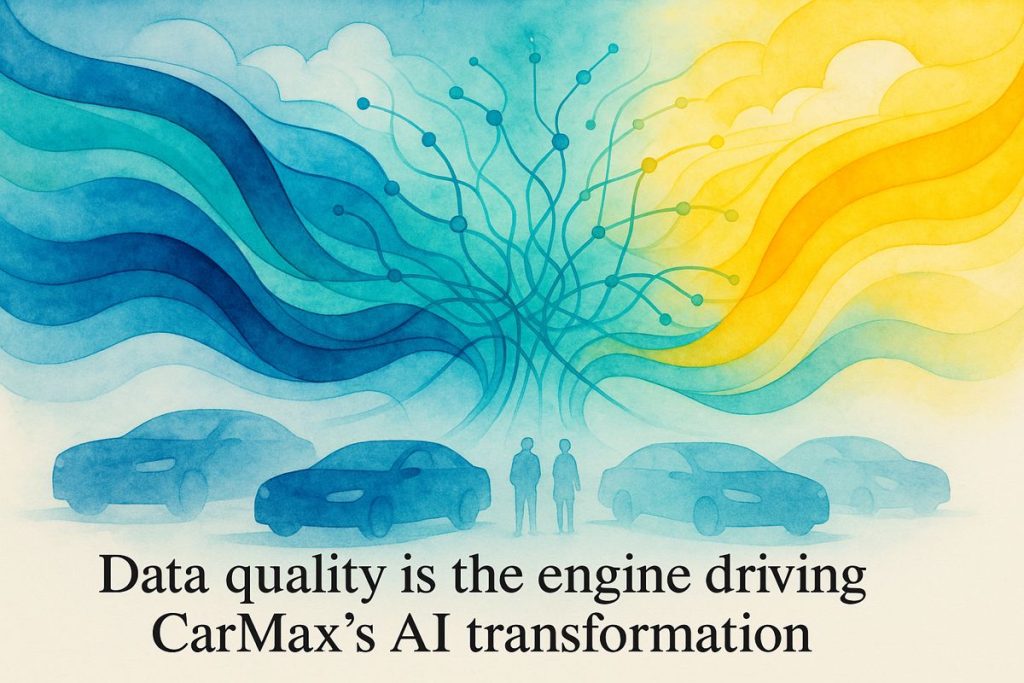CarMax has quietly transformed into a tech powerhouse. By moving all its data to the cloud with Microsoft Azure, CarMax gained real-time access to its information, making everything faster and smarter. Now, AI helps them give instant, accurate car prices online, shows customers cars they’ll love, and even picks the best photos for listings. All these changes help CarMax work smoothly and make buying or selling a car feel easy and personal. CarMax’s tech journey proves that even a classic company can shine bright with the right digital tools.
How has CarMax transformed its business with AI and cloud technology?
CarMax revolutionized its business by migrating from legacy data centers to Microsoft Azure, enabling unified, real-time data access. Leveraging AI and machine learning, CarMax delivers instant online appraisals, personalized customer experiences, and efficient operations, establishing itself as a trailblazer in AI-driven used car retail.
A New Engine Under the Hood
At first glance, CarMax looks like your typical American retail behemoth—gleaming lots, smiling salespeople, and enough SUVs to blot out the sun. But, if you’re willing to go beyond the polished chrome and slip behind the digital curtain, you’ll find a technological palimpsest: freshly rewritten code and cloud-native infrastructure humming beneath decades-old business models. This isn’t hyperbole; we’re talking a full-blown metamorphosis, quietly orchestrated over multiple years, and it’s all about that one elusive commodity—data.
I still remember an afternoon last autumn (coffee in hand, my third that day) when I tried to explain to a skeptical colleague why CarMax was worth watching. “Retailers are always talking about ‘going digital’,” he scoffed, “but what’s really different here?” I had to stop and ask myself if I was getting swept up in the hype. But then I stumbled across CIO Dive’s report and realized: CarMax wasn’t just migrating data—they were, in effect, roasting their old data warehouses over an open fire and building something cloudborne, unified, and resilient in its ashes.
Their cloud journey—anchored by a partnership with Microsoft Azure—isn’t just about swapping out servers. It’s a systematic, almost monastic, discipline. Data accessibility isn’t a “nice-to-have” anymore; it’s the oxygen of the business. Abhi Bhatt, the company’s VP of Technology—Data and AI, put it bluntly in a ThoughtSpot podcast: “I don’t end a day without bringing up the importance of data and data quality for AI.” You can almost hear the exasperation in his voice—like someone trying to convince a toddler to eat more broccoli. But he’s right: without clean, accessible data, AI is just a mirage.
From Legacy Drudgery to Azure-Infused Alchemy
If you’ve ever tried to reconcile spreadsheets from three different decades, you know the pain. CarMax’s old on-premises data centers were a patchwork quilt—beautiful in theory, but riddled with holes. The move to Azure not only stitched those holes, but it also spun the fabric into something more hyperspectral—every customer query, every transaction suddenly visible in vibrant, real-time color.
The cloud-first dogma also meant fewer late-night panic attacks over failing hardware (been there, done that, got the existential dread). Unified data structures brought teams into the same room—figuratively, at least. And the single source of truth? Priceless. It’s like switching from Morse code to fiber optic—same message, but at the speed of thought.
I’ll admit, at first I doubted whether their bet on Azure would pay off. What if they’d just swapped one flavor of chaos for another? But as Microsoft’s Cloud Blog points out, scalable machine learning tools and generative AI capabilities transformed CarMax from a data hoarder to a data virtuoso. Bam! Suddenly, they could roll out new digital products with the kind of agility that’d make a startup blush.
And yes, it smells different, too. There’s an air of ozone and fresh circuit boards—maybe that’s just my imagination, but the shift is palpable.
AI on the Lot: Real Value, Not Vaporware
You’d be forgiven for thinking all this talk of “AI transformation” is just frothy marketing. But here’s where things get concrete. Take CarMax’s appraisal engine—a proprietary blend of machine learning and statistical wizardry, now responsible for over 14 million online appraisals in fiscal 2024 (National CIO Review). Instant, highly accurate valuations. No more squinting at Kelly Blue Book and praying.
Have you ever uploaded a license plate photo and received a real offer in less than a minute? That’s the new normal. AI checks ownership, crunches the numbers, and—voilà—offers up a price, all while your coffee is still hot. CarMax’s omnichannel dance means if you browse SUVs online, the guy in the showroom already knows your preferences, thanks to a unified CRM. It’s like walking into a bar where the bartender already has your drink ready (an oddly comforting sensation, even if you’re not thirsty).
They’re even using AI to cherry-pick the best vehicle images. The algorithms have an eye for glossy reflections and clean lines—a far cry from the blurry, washed-out thumbnails of yesteryear. Marketing budgets are no longer set via finger-in-the-wind guesswork, either. Now, internal and third-party data—weather, traffic, the whole nine yards—feed into a continuous decision-making loop.
Guardrails, Culture, and That Inevitable Human Touch
Here’s where it gets tricky. AI isn’t just a magic wand; it comes with its own Pandora’s box of ethical dilemmas and regulatory headaches. CarMax, perhaps with a nod to the European General Data Protection Regulation (GDPR) zeitgeist, established an AI Center of Excellence— a cross
